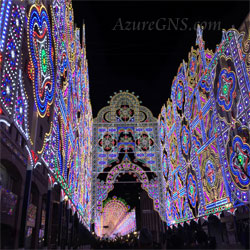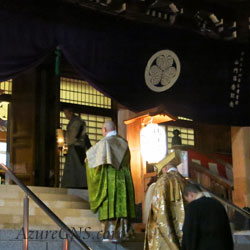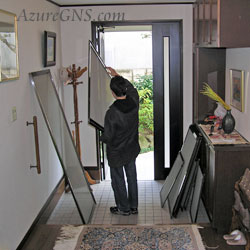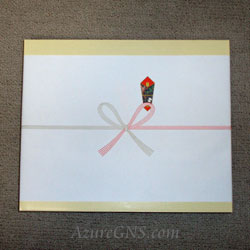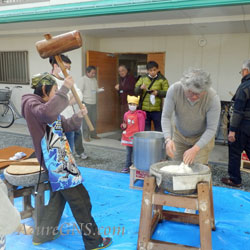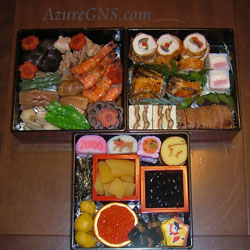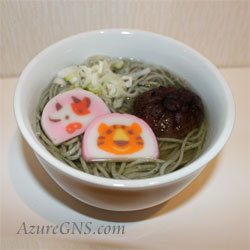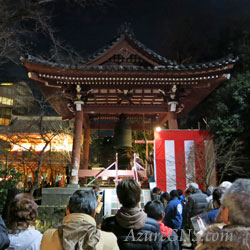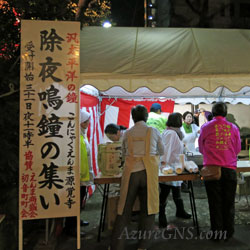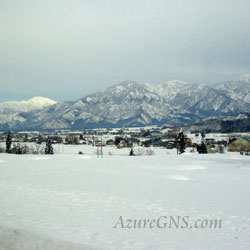年の暮れ
(12月)
Toshi-no-kure;
The End of a Year
(December)
●年の暮れ Toshi-no-kure; the end of a year
●年末の大掃除 year-end cleaning
●お歳暮 O-seibo; year-end gift
●忘年会 year-end party
●歳末大売出し year-end sale
●年賀状 New Year’s greeting card
●餅つき Mochi-pounding; rice cake-poundng
●蕎麦 soba; buckwheat noodles
●年越し蕎麦 Toshikoshi-soba
●長寿 longevity
●大晦日 New Year’s Eve
●除夜の鐘 Joya-no-kane; the ringing of the temple bell on New Year’s Eve
●煩悩 (earthly) passion; (worldly) passion; (earthly) desire; (worldly) desire
●帰省 homecoming
●帰省する (to) go to one’s hometown; (to) return to one’s hometown
◆師走は12月の別名で、「師」は先生や僧、「走」は走るを意味します。
Shiwasu is another name for December: ‘Shi’ means a teacher or a priest, and ‘wasu’ means to run.
◆年末は最も忙しい時期なので、先生や僧さえも走るという意味です。
It means that even a teacher or a priest must hurry because the end of a year is the busiest season.
◆大掃除をしたり、年賀状を書いたり、お歳暮を贈ったり、その他いろいろなことをしなければいけません。
People have to do year-end cleaning, write New Year’s greeting cards, present year-end gifts and other activities.
◆お歳暮とは年の暮れの贈り物のことで、その年の好意や親切に対する感謝の気持ちを込めて送られます。
O-seibo means year-end gifts which are presented as an expression of appreciation for favors and kindnesses received during the past year.
◆この時期は忘年会や歳末大売り出しを楽しみます。
People enjoy year-end parties and year-end sales at this time of the year.
◆お餅はお正月には欠かすことができない食べ物です。
Mochi, rice cakes, is essential for the New Year celebrations.
◆昔は年末に多くの家でお餅つきをしましたが、最近はほとんどの家でお餅を買います。
In the past, many households used to do Mochi-pounding at the end of a year, however, these days people usually buy ready-made rice cakes.
◆もうひとつお正月に欠かせない食べ物は、さまざまな縁起が良く意味のある料理がお重に入っているお節料理です。
Another indispensable food for New Year is Osechi-ryori: various lucky and meaningful dishes are kept in a set of lacquer-ware boxes.
◆お節料理は各家庭で年末につくられます。
Osechi-ryori is prepared in each household at the end of the year.
◆主婦は正月3日間料理をしなくてすみます。
This allows housewives not to have to cook during the first three days of the New Year.
◆最近はデパートでお節料理を買う人が増えています。
In recent times more and more people buy ready-made Osechi-ryori at department stores.
◆蕎麦は細長いので長寿の象徴と考えられているため、大晦日に年越し蕎麦を食べます。
Soba, buckwheat noodles, symbolizes longevity because the noodles are long in shape, therefore, Toshikoshi-soba are eaten on New Year’s Eve.
◆大晦日の夜、国営放送であるNHKは有名な歌謡ショーを放送します。
On New Year’s Eve, NHK, a national broadcasting station, broadcasts a famous popular song show.
◆この番組は紅白歌合戦といいます。
This program is called Kohaku-uta-gassen, which means, red team vs. white team singing contest.
◆女性歌手は赤組、男性歌手は白組になり、お互いに競い合います。
Female singers belong to the red team, male singers belong to the white team, and both teams compete against each other.
◆除夜の鐘は大晦日の夜、日本中のお寺でつかれます。
Joya-no-kane means temple bells, which are tolled throughout Japan on New Year’s Eve.
◆仏教では人間は108の煩悩を持っていると信じられており、それらの煩悩を取り除くために連続して108回鐘がつかれます。
According to Buddhist belief, man has 108 evil thoughts, and the bells are tolled 108 times simultaneously to expel those evil thoughts.
(より詳しい情報は「年の暮れ」を覧下さい。)
(Please see “Our End of a Year Experience” for further information.)
Copyright (C) Azure Global Network Services. All Rights Reserved.
